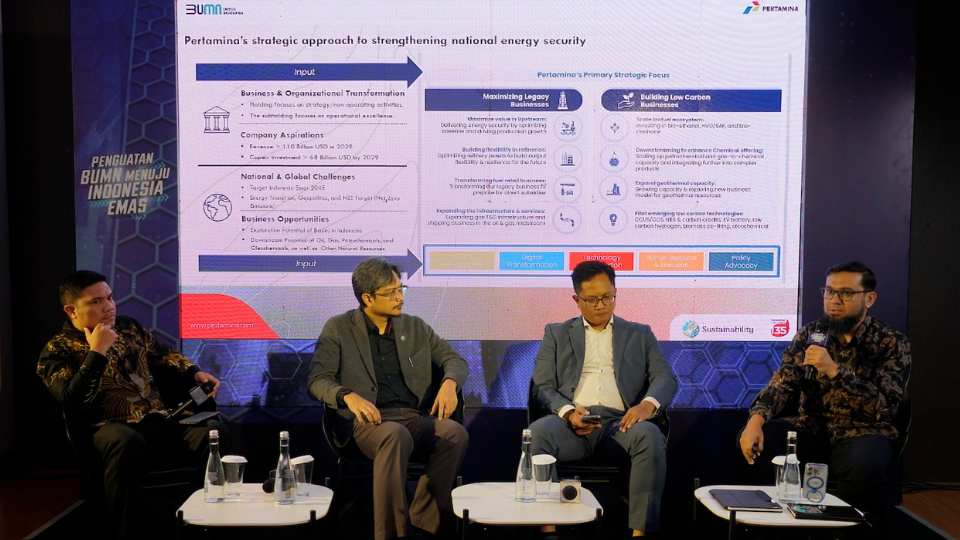Global developments are forcing energy companies to adjust their businesses. The world urges these companies to help reduce their negative impacts on nature. This was the focus of a public discussion held by SBM ITB in Bandung on Thursday (12/9).
Fahmi Hamim Dereinda, a Sustainability Specialist at PT Pertamina and one of the event’s speakers discussed how Pertamina is transforming the challenges of energy development strategies into opportunities for growth in the energy sector. He emphasized that energy security, accessibility, and environmental sustainability are key factors in turning these challenges into opportunities for more effective strategies.
Fahmi noted that Indonesia requires greater energy consumption to stimulate economic growth while ensuring the reliability of domestic energy sources through efficient technologies. Additionally, Indonesia must explore its diverse renewable energy potential. These three factors, he said, are vital opportunities in addressing the nation’s energy challenges.
As a state-owned enterprise, Pertamina, according to Fahmi, must champion the implementation of sustainable energy solutions to support the goal of net zero emissions. Pertamina’s strategic approach includes creating an ecosystem for bio-gasoline, maximizing upstream business value, transforming the fuel retail sector, expanding geothermal capacity, and more, all to enhance national energy security.
Dr. Dzikri Firmansyah Hakam, a lecturer at SBM ITB, highlighted several important aspects of Indonesia’s energy development strategy. He stressed the need to focus on energy sustainability, accessibility, and security, which are currently deficient. He noted that Pertamina plays a crucial role in fostering energy sustainability, and its investment in the oil and gas sector is part of its responsibility in addressing this issue.
According to Dr. Dzikri, collaboration between State-Owned Enterprises like Pertamina and other sectors is essential, as the challenges in Indonesia’s energy sector are too vast to tackle independently. Technological development must be implemented through cooperation among various related elements.
He also emphasized the importance of stronger connectivity between industry and academia, particularly in transitional energy. Competencies in the Energy Market and Energy Finance, which are being studied by SBM ITB academics, play a critical role in this process.
Dr. Eng. Pandji Prawisudha, S.T., M.T., a lecturer in Mechanical Engineering at ITB, concurred that Pertamina could evolve beyond its Oil and Gas operations. He suggested that Pertamina could become a leader in renewable energy development, requiring greater collaboration with academic institutions.
Meanwhile, PT PLN (Persero) Executive Vice President of Electricity System Planning, Warsono, explained that PLN is beginning to develop electricity projects by integrating a green supply chain. Green Hydrogen is crucial for Indonesia to meet its Net Zero Emissions target by 2060.
Warsono explained that the application of Green Hydrogen will help decarbonize multiple sectors in Indonesia, impacting industries such as manufacturing, transportation, and power generation. As such, PLN plays a pivotal role in accelerating the development of Green Hydrogen to ensure energy sustainability and the achievement of crucial energy sector targets in Indonesia.




